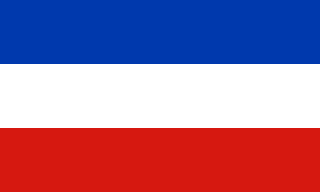
The Duchy of Schleswig was a duchy in Southern Jutland (Sønderjylland) covering the area between about 60 km north and 70 km south of the current border between Germany and Denmark. The territory has been divided between the two countries since 1920, with Northern Schleswig in Denmark and Southern Schleswig in Germany. The region is also called Sleswick in English.
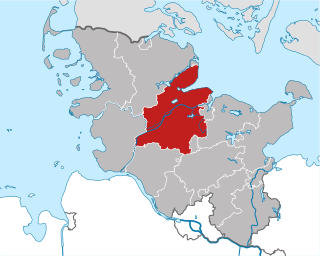
Rendsburg-Eckernförde is a district in Schleswig-Holstein, Germany. It is bounded by the city of Kiel, the district of Plön, the city of Neumünster, the districts of Segeberg, Steinburg, Dithmarschen and Schleswig-Flensburg, and the Baltic Sea.

Ostholstein is a district in Schleswig-Holstein, Germany. It is bounded by the districts of Stormarn, Segeberg and Plön, the Baltic Sea and the city of Lübeck.

Holstein is the region between the rivers Elbe and Eider. It is the southern half of Schleswig-Holstein, the northernmost state of Germany.
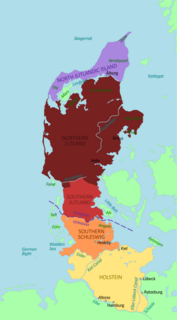
The history of Schleswig-Holstein consists of the corpus of facts since the pre-history times until the modern establishing of the Schleswig-Holstein state.

The House of Glücksburg, shortened from House of Schleswig-Holstein-Sonderburg-Glücksburg, is a Dano-German branch of the House of Oldenburg, members of which have reigned at various times in Denmark, Norway, Greece and several northern German states.

Holstein-Gottorp or Schleswig-Holstein-Gottorp is the historiographical name, as well as contemporary shorthand name, for the parts of the duchies of Schleswig and Holstein, also known as Ducal Holstein, that were ruled by the dukes of Schleswig-Holstein-Gottorp. Other parts of the duchies were ruled by the kings of Denmark.

The House of Oldenburg is a European dynasty of North German origin. It is one of Europe's most influential royal houses, with branches that rule or have ruled in Denmark, Iceland, Greece, Norway, Russia, Sweden, Schleswig, Holstein, and Oldenburg. The current Queen of Denmark and King of Norway, the former King of Greece, the consort of the monarch of the United Kingdom, as well as the first thirteen persons in the line of succession to the British throne, are all patrilineal members of the Glücksburg branch of this house.

The First Schleswig War or Three Years' War was the first round of military conflict in southern Denmark and northern Germany rooted in the Schleswig-Holstein Question, contesting the issue of who should control the Duchies of Schleswig and Holstein. The war, which lasted from 1848 to 1851, also involved troops from Prussia and Sweden. Ultimately, under international pressure, the Prussians had to withdraw their forces. As a result, the war ended in a Danish victory over the rebels and the signing of the London Protocol in 1852. A second conflict, the Second Schleswig War, erupted in 1864.

The Second Schleswig War was the second military conflict over the Schleswig-Holstein Question of the nineteenth century. The war began on 1 February 1864, when Prussian forces crossed the border into Schleswig. Denmark fought the Kingdom of Prussia and the Austrian Empire. Like the First Schleswig War (1848–52), it was fought for control of the duchies of Holstein and Lauenburg, due to the succession disputes concerning them when the Danish king died without an heir acceptable to the German Confederation. Controversy arose due to the passing of the November Constitution, which integrated the Duchy of Schleswig into the Danish kingdom in violation of the London Protocol. Reasons for the war were the ethnic controversy in Schleswig and the co-existence of conflicting political systems within the Danish unitary state.

The Schleswig-Holstein Question was a complex set of diplomatic and other issues arising in the 19th century from the relations of two duchies, Schleswig and Holstein, to the Danish crown and to the German Confederation. The British statesman Lord Palmerston is reported to have said: “Only three people have ever really understood the Schleswig-Holstein business—the Prince Consort, who is dead—a German professor, who has gone mad—and I, who have forgotten all about it."
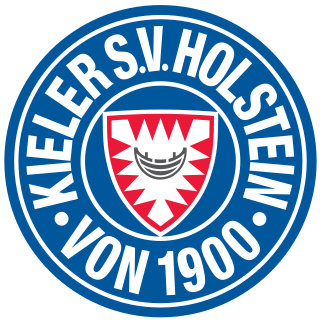
Holstein Kiel is a German association football and sports club based in the city of Kiel, Schleswig-Holstein. Through the 1910s and 1920s the club was a dominant side in northern Germany winning six regional titles and finishing as runners-up another six times. Holstein also made regular appearances in the national playoffs, finishing as vice-champions in 1910 before capturing their only German title in 1912. They remained a first division side until the formation of the Bundesliga in 1963.

The Province of Schleswig-Holstein was a province of the Kingdom of Prussia from 1868 to 1946.

The Duchy of Holstein was the northernmost state of the Holy Roman Empire, located in the present German state of Schleswig-Holstein. It was established when King Christian I of Denmark had his County of Holstein-Rendsburg elevated to a duchy by Emperor Frederick III in 1474. Holstein was ruled jointly with the Duchy of Schleswig by members of the Danish House of Oldenburg for its entire existence.
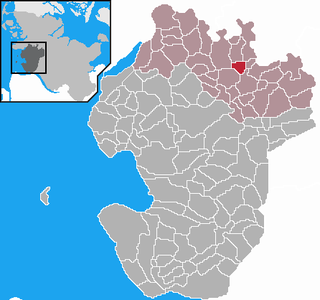
Glüsing is a municipality in the district of Dithmarschen, in Schleswig-Holstein, Germany. On 1 April 1934, the municipality was formed due to the disbandment of the Amt Kirchspielslandgemeinde Tellingstedt which at the time, had around 85 inhabitants.

Noer is a municipality in the district of Rendsburg-Eckernförde, in Schleswig-Holstein, Germany.

Sterup is a municipality in the district of Schleswig-Flensburg, in Schleswig-Holstein, Germany.

The Oberliga Schleswig-Holstein, formerly referred to as Schleswig-Holstein-Liga, is the fifth tier of the German football league system and the highest league in the German state of Schleswig-Holstein. It is one of fourteen Oberligas in German football.
This is a survey of the postage stamps and postal history of Holstein, Schleswig-Holstein, Schleswig and incidentally Lauenberg. Separate stamps were issued for Holstein (1850), Schleswig (1864-1867), Holstein (1864-1866), Schleswig-Holstein (1865) and Schleswig (1920).

